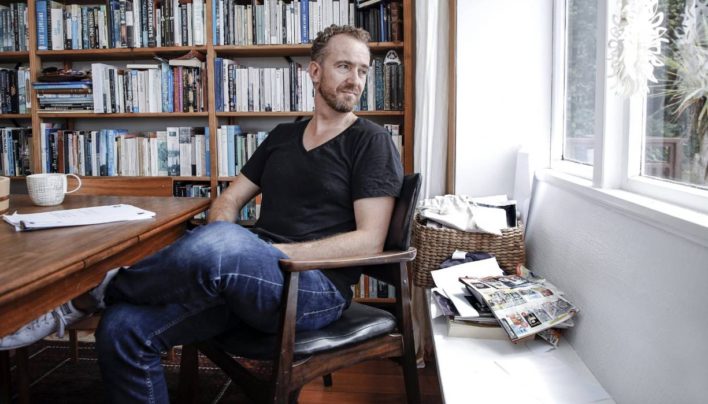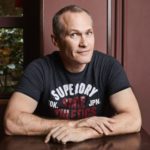Carl Shuker is a former editor at the British Medical Journal and the author of four novels. His latest, A Mistake, is a small capsule of a novel that explodes with fast paced drama about the battles female surgeon Elizabeth Taylor confronts, and the mistakes she makes, as she succeeds in a male-dominated field. It has been shortlisted for the $55,000 Jann Medlicott Acorn Prize for Fiction award and you can put your best dress on and tune in to the Ockham New Zealand Book Awards YouTube channel on May 12th at 6pm to be part of the ceremony!

What does a day in the life of Carl Shuker look like normally?
I read this question and was immediately stumped – who can even remember? I guess until recently things have been characterised by tiredness, discipline and regularity to keep family life stable (I have a daughter of 8 and a son of 2). I work a job in healthcare and improvement four days a week – I do childcare, I work out at the gym, I eat the same protein smoothie for breakfast every morning. I turn up on time, every time.
I think back on writing a book like The Method Actors – for all its myriad faults it had the virtue of intensity. That was the way it was written. Eight hours a day at least, at the desk, alone, seven days a week, editing till 3 or 4 in the morning, sleeping in til midday, for two and a half years. The aesthetic kind of matched the composition – too much, too much of the time. But I was 27 and single.
Now I plan, and I turn up.
What does a day in the life of Carl Shuker look like in isolation?
Isolation with two kids is a battle. We are lucky enough to have a yard, some garden. We bought a trampoline the day before lockdown for my son’s second birthday. I’ve sewn a lawn, built steps from heavy redwood sleepers, built a raised vegetable garden. All kinds of DIY, heavy physical work and hammering things helps me, I’m finding. On allocated days I work in the spare bedroom downstairs, typing, Zoom meetings, listening to Anna wrangling a screaming two-year-old directly above my head.
Other days she writes and I take the kids on long walks, then subside into death and infection rates for a couple of hours in the middle of the day as my son sleeps and my daughter races through all seven books of Harry Potter. From 4 pm are the witching hours all parents know – ragged, scrappy, making dinner, getting everyone fed and bathed and squared away, and then the cleaning up.
In a sense suburban lockdown New Zealand is like the Cold War 1950s – local, quiet, family-oriented. Sometimes desperately boring, nervy, anxious. Tūī in the trees, the threat of mass death and global catastrophe in our dreams and imaginations constantly.
How do you set yourself up for a day of writing?
Reading the night before is probably the best answer – reading equals dreaming and the dreaming is the key. Surrounding myself with all the elements – pictures on the walls, music curated, quotes transcribed so everywhere I look it’s there: the world of the book all around me until everything resonates in the same key. Then it’s the matter of the right pens (black Pilots), blank unlined A4, a space on a desk and the full will and intention to fill a page with black paragraphed (even italicised) freehand, at least 500 words a day like Graham Greene. Then I type it up. That’s how you do it. That’s the day’s work. Anything else is a failure and that happens a lot.
What was it that triggered the idea to run Elizabeth’s story parallel with the US Space Shuttle Challenger?
It was failure. I went through a bit of it and happened across a second-by-second commentary of the failure of Challenger, and it spoke to me deeply and directly. A lot of the work I do in healthcare uses other high-risk industries to think about systems and safety in healthcare. Challenger was a brilliant example of the intersection of data (or lack of), intractably clashing incentives and massive repercussions of decisions on tiny things. Something to do with the simple unfairness of certain stuff, and of the need for the public to nail a scalp to a post in the town square. I started to know Elizabeth deeply and knew she would have a taste for a story like this.
Why did you write A Mistake from the perspective of a female surgeon rather than a male?
I began the book with a male surgeon. As soon as I began to build him in my brain I started to think about what he might do outside work, and immediately I realised his sex life probably involves nurses and he practices hackysack while on the phone managing the organ donation of car accident victims, and he probably goes mountain biking at Makara. Boom – that was it. Unutterably boring, dead book. The original point of it was a brilliant Type-A, apex-predator general surgeon suddenly discovers from public data he’s not quite as good as he thought he was. As soon as I started exploring the idea that she was a woman, there was suddenly the rough thing, the hard thing that made it come alive. She had further to fall.
What research did you undertake to ensure Elizabeth’s role not only as a surgeon but as a woman was as authentic as it was?
It’s not for me to say it came off as authentic, though of course I hope it does and I worked hard to approach that. In my work I am surrounded by brilliant women – brilliant women basically run NZ healthcare. Researching the healthcare-specific details was one thing, the usual hard work of reading, comprehension, expression. Getting Elizabeth right was a matter of a sympathetic imagination and the paying of appropriate attention to those women and their thinking and the way they survive. I was aware two things might happen when the book came out – if I failed people would say I was a white male author appropriating a woman’s experience and they would hate the book and me. If I got her right it wouldn’t be an issue.
A Mistake is a small capsule of a novel that explodes with enough drama to make a series out of. Did you write it with that in mind?
Definitely not! The first throb was about restriction – I’ve always wanted to write a really short perfect piece of brutal minimalism and this is probably as close as I get to that. Absolutely pared of description, narration, adjectives, and sentiment. A really violent reaction to previous books where elaborate description, beautiful writing was “important”. I wanted to go so far away from that, and make this riff-based and rapid.
I started writing this in the full flush of the golden age of streaming TV and I had to ask myself what I had to offer in that kind of environment. What could I give? And I fell back in love and trust with the reading brain, and the direct access to the CNS that pared-back episodic prose can give. Fundamental tools and tricks like believing in a reader’s brilliant brain and knowing they are ahead of you and trying to get ahead of them to blow that brain.
If you were stranded on an island with one book what book would it be and why?
The Holy Bible, King James version. Because if you’re not drawing from 3000 years of culture you’re living hand to mouth as Goethe said, and this would be a good place to start. “Mid period.”
What scenes in A Mistake did you find challenging to write and why?
The last third defeated me for months. I’d always had in mind as part of Elizabeth’s decline as the consequences of the mistake coalesce around her that she’d attend a debauched three-day party of plastic surgeons in fancy dress at a Ponsonby studio a tailor friend told me about. I wrote the whole scene – it was nightmarish and comic and pretty overwrought. She gets drunk, a guest has a cardiac episode, she is asked to help but is too drunk to do anything useful. It was so dark and the bitterness was ladled on. It was all just down and down and down (she literally slides down some stairs at one point). At that point I stalled fatally.
“Can’t you be kinder to her?” my wife Anna said at some point, and I realised that I was in a sense hiding from the book by being hard on her. I was hiding, using cruelty to my character to distance myself from the difficulties, using this stuff as a crutch to help the writing. So I cut the scene and softened and made someone appreciate her, and that set it all up for a further fall. A greater breadth of vision made it breathe more deeply, I hope. And thinking in scenes. How can I build a scene to accommodate the fates I have allocated, first of all, then as I write those scenes how can those fates get more complex and interesting.
How did you celebrate when you found out your book was a Jann Medlicott Acorn Prize for Fiction finalist?
I’m very grateful to be on this list, but I don’t know if I did… What I have learned in this game is to celebrate your own work and achievements rather than external acclaim or pats on the back. Nietzsche said everything that is complete and perfect is admired; everything evolving is underestimated. I choose to admire evolution and to tell myself well done when I do what I think is good work. Being a recovering good(ish) Protestant I am mostly only truly happy lost in a task, and I get depressed when things finish. Sisyphus was happy pushing his rock up the hill, Camus saw. So I celebrate – quite deliberately and maybe with not a whole lot of true feeling – when I feel like I’ve done something good, not when someone else tells me I have, should they happen to.
That being said, “Nice things are nicer than nasty things” as Kingsley Amis once said, and a light-hearted celebration of cool things happening – in the form of spreading the wealth via a party (as once we used to contemplate) or shared Champagne – is the best way. Stay Zen; stay the course.






